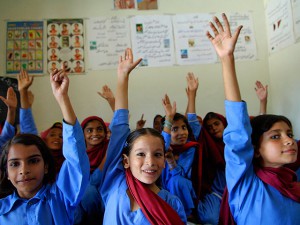National implementation of international standards

In order to give them full effect, the rights conveyed by human rights treaties and international labour standards need to be translated into national legislation and policies. Legal provisions should clearly establish the mechanisms necessary for a successful implementation of social protection policies including: financing and expenditure mechanisms; administrative arrangements, monitoring, evaluating and reporting mechanisms; information and awareness raising systems; and for enhancing good governance.
Photo credit: “Education-Éducation 9” via DFTAD | MAECD (CCBY 2.0 via Flickr)
Adequacy of Benefits
From a rights-based perspective, the level of benefits provided must be adequate. According to the CESCR’s General Comment 19 (para 22), “Benefits, whether in cash or in kind, must be adequate in amount and duration in order that everyone may realize his or her rights to family protection and assistance, an adequate standard of living […]
Comprehensive, Coherent and Coordinated Policies
The interdependence, indivisibility and mutually reinforcing nature of human rights necessitates a holistic approach to social protection. As such, under international human rights law, social protection programmes should be one element within a broader strategy aimed at overcoming poverty and realizing all human rights, including economic, social and cultural rights such as the rights to […]
Toolkit on ILO Social Security Standards
The Toolkit on ILO Social Security Standards was developed with the aim of raising awareness about ILO social security standards and promoting their ratification as well as increasing their impact and application in national contexts. The toolkit provides very practical and useful insights as to the ratification procedure, model instruments of ratification as well as […]
Report on austerity measures and economic and social rights
The present report, submitted pursuant to General Assembly resolution 48/141, considers the impact of austerity measures on economic, social and cultural rights, in particular on the right to work and the right to social security, with a specific focus on women, migrants and older persons. It also lays out the criteria States should apply when […]
Building Decent Societies: Rethinking the Role of Social Security in Development
This book, edited by Peter Townsend, makes the case for a comprehensive social security system to be developed in all countries, including the poorest ones, in order to eliminate desperate conditions of poverty, to reverse growing inequality and to sustain economic growth. The establishment of universal social security systems has been one of the cornerstones […]
Namibia Social Protection Floor Assessment
This report is the result of collaboration between the Government of Namibia and the ILO. Drawing on the Social Protection Expenditure and Performance Review (SPER) and Social Budget methodologies, the objectives of the report are: 1) to improve the knowledge and information base on the coverage and performance of social protection in Namibia, focusing particularly […]

